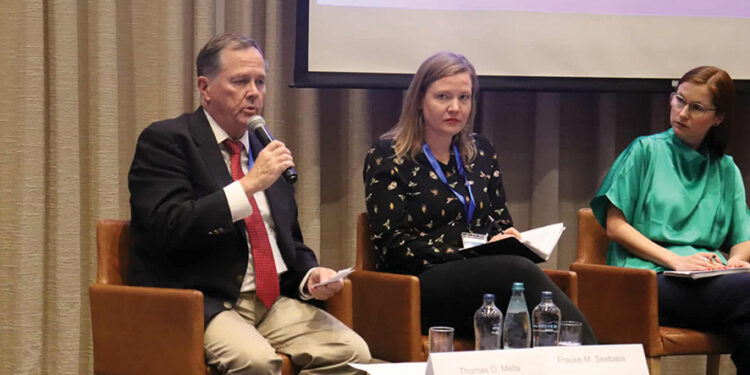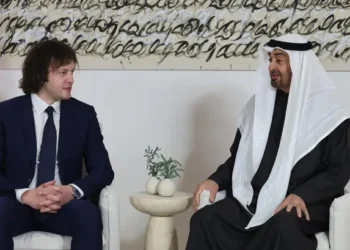What’s different this time is that the current ‘shooting star’ seems to be falling faster and deeper, with no clear bottom in sight. — That’s how Thomas O. Melia, a seasoned American diplomat and democracy advocate, characterizes Georgia’s current political trajectory. Having been involved in promoting democracy and human rights in Georgia for more than twenty years, including during his tenure as Deputy Assistant Secretary of State under President Obama, Melia has seen the country’s progress and setbacks up close. Speaking to RFE/RL’s Georgian Service at the 2025 Rondeli Security Conference in Tbilisi, he warned that Georgia’s drift away from its Western allies may be pushing it toward “strategic irrelevance.” Yet he also insisted the door to democratic renewal remains open.
You have a long history with Georgia, having kept an eye on the country close to two decades now. Looking back at Georgia—then and now—what do you see? What are the major differences?
Over the years, Georgia has gone through a series of political trajectories that resemble shooting stars. A new government comes in—full of energy, full of reformist zeal, and democratic consolidation—usually backed by strong international support. We saw that in the Shevardnadze period, then again during Saakashvili’s time, and now, to an extent, with the Georgian Dream era under Ivanishvili. But, time and again, we see these governments lose interest in international advice and support, grow less tolerant of domestic dissent, and become more autocratic in different ways.
What’s different this time is that the current “shooting star” seems to be falling faster and deeper—with no clear bottom in sight. That’s one of the central questions here at this conference: Is it irreversible? My message is, no—it’s not. Georgia can bounce back, just as countries like Poland and Brazil did after periods of rising authoritarianism. Those were turnarounds driven by elections. Whether Georgia can follow that path remains to be seen.
The opposition failed to present a unified, coherent alternative in the last election. That carries some responsibility. But there’s also a larger issue: unlike past governments, even when critical of the West, Shevardnadze and Saakashvili continued engagement with Washington and Brussels. This current government, inexplicably, has turned away from Georgia’s friends in the West—those who genuinely want it to succeed. And that has made it much harder for those of us who know and care about Georgia to help.
What do you think is driving this strategic shift? If it’s a balancing act between great powers, wouldn’t logic dictate you don’t alienate one of the key players?
I’ll offer one analysis: in autocratizing governments, as they tighten control over the opposition, media, and civil society, a certain paranoia starts to emerge. This government has imprisoned members of the previous administration, including the former president, imprisoned its own former members and allies, and is threatening other independent voices—journalists, NGOs. That creates fear among current officials: if they ever lose power, they might face the same fate. Whether it’s legitimate prosecution or politically motivated charges, the fear is real.
So what do they do? They double down. They bend the rules further, silence critics more aggressively, and cling to power at all costs.

If you had to pinpoint one core issue that caused the rift between Georgian Dream and the West, what would it be?
From Washington’s perspective, a major turning point was when the EU offered Georgia candidate status—essentially, an invitation to join the European family. And what did the government do? They said, “We’re going to pause that.” That’s a problem.
In the US, there’s long been deep appreciation for Georgia—a small, faraway country that nonetheless played an outsized role in military endeavors like Afghanistan. Georgia’s democratic progress was celebrated.
Americans inside and outside government still have a great deal of goodwill toward Georgia. We want Georgia to succeed, to be a democracy, to be part of the West. The door is open. The Georgian people are ready to walk through it. It’s just a small group in power who are blocking the way
But despite all that, the rift grew. The Biden administration tried to engage Georgia, particularly around laws like the “foreign agents” bill. They said, “Please don’t do this.” But the Georgian government moved ahead anyway. The way the Georgian government treated Dunnigan and her predecessor Kelly Degnan—frankly, it was disgraceful—has alienated many in Washington.
The US responded by pausing some official engagement—but continued to support civil society.
And that didn’t seem to deter the government.
No, it didn’t. And that’s part of the problem. The punishments for democratic backsliding are more about the withdrawal of affection than hard sanctions. Yes, some individuals may lose US visas, but that’s hardly a major deterrent.
You mentioned “strategic irrelevance” in your speech yesterday. What are the dangers of that for a country like Georgia?
Georgia is small. It doesn’t have major economic or military clout. It doesn’t have oil or gas. But it had significance because of its willingness to partner with the West. The contributions of the Georgian military in Afghanistan, for example, earned it respect in Washington.
But if Georgia abandons those partnerships, it risks being forgotten. Strategic irrelevance means being left alone, unappreciated, and losing access to the very opportunities that could help it thrive.
Has that already happened in DC?
Yes, to a significant extent. The Biden administration tried hard. Senior officials came to Tbilisi, but found it difficult to secure high-level meetings, including with Mr. Ivanishvili and the Prime Minister. It just seems like a series of bad decisions are being made.
There’s a growing view that Georgian Dream wants to model itself on Azerbaijan. But without Azerbaijan’s resources, is that even possible?
How much oil does Georgia have? How much natural gas? What regional leverage can it offer in terms of security? Azerbaijan borders Iran. Georgia doesn’t. Azerbaijan has strategic weight—Georgia doesn’t. So, no, I don’t think the Azerbaijan 2.0 model is viable.
Let’s talk about the Megobari Act. What’s its current status? What are the prospects?
It passed the House of Representatives. It’s been approved by the Senate Foreign Relations Committee. But in the Senate, the leadership won’t bring it to a vote unless the White House and State Department give the green light. That hasn’t happened yet.
Why not?
Likely because Georgia doesn’t rank in the top ten or even top twenty priorities in Washington right now. That’s what strategic irrelevance looks like.
If it does pass, would it become US policy?
Yes. If it passes the Senate, goes to the President, and is signed, it becomes law—and policy.
Do you think that will happen?
Honestly, it’s hard to say. The Trump-Rubio administration is unpredictable. Even if they support it, they might not implement it. That’s just the reality now.
The Georgian PM sent an open letter to Secretary of State Marco Rubio. As a political act, how would you assess it?
That letter seemed more like a domestic political move than serious diplomacy. A better approach would’ve been a private letter or a direct outreach to the US government. As it stands, it seemed amateurish—more show than substance.
And now the US Ambassador is leaving. No replacement in sight. So if both embassies are led by chargés d’affaires, is that the next chapter of irrelevance?
Yes. It means a weaker dialogue. Less engagement. And that’s a loss for both sides.
Any silver linings?
Only this: Americans—inside and outside government—still have a great deal of goodwill toward Georgia. We want Georgia to succeed, to be a democracy, to be part of the West. The door is open. The Georgian people are ready to walk through it. It’s just a small group in power who are blocking the way.
Interview by Vazha Tavberidze














